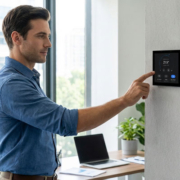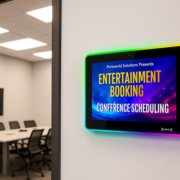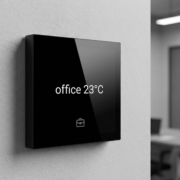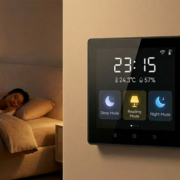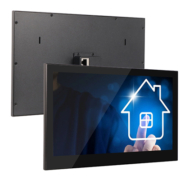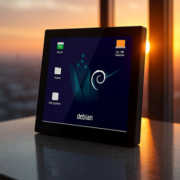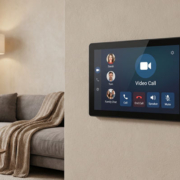Why the Android Smart Control Panel Guarantees Maximum Device Compatibility
As the world becomes increasingly interconnected through smart devices and IoT solutions, the need for seamless integration between various devices has never been more critical. One of the most effective ways to achieve this is through the use of Android smart control panels. These versatile panels, powered by the Android operating system, offer unmatched compatibility with a wide range of devices, ensuring that users can control, manage, and interact with various smart technologies effortlessly.
In this article, we will explore why Android smart control panels are the go-to solution for ensuring maximum device compatibility and how Portworld’s products and services leverage this powerful platform to provide seamless integration for various applications.
1. Android’s Open-Source Flexibility
One of the key advantages of Android as an operating system is its open-source nature. Unlike proprietary systems, Android allows for greater flexibility, enabling developers to customize and optimize the platform to work with a broad range of hardware and software solutions. This flexibility is essential when creating smart control panels that need to support a variety of third-party devices and systems.
- Customization: Android’s open-source framework allows manufacturers like Portworld to customize the OS, ensuring it meets the unique needs of their clients. Whether it’s adjusting the user interface (UI), integrating new device protocols, or ensuring compatibility with specific industry standards, Android provides the adaptability needed for diverse applications.
- Wide Compatibility: Android’s ability to work with a wide range of hardware ensures that Android smart control panels can integrate with various devices, from smart home systems (lights, thermostats, security cameras) to industrial automation (sensors, machines, control systems). This makes Android-based control panels a universally compatible option for multiple sectors.
2. Support for Industry-Standard Communication Protocols
To ensure seamless integration, smart control panels must be able to communicate with a wide array of devices, which typically use different communication protocols. Android’s broad support for industry-standard protocols makes it an ideal choice for controlling and managing diverse devices.
- Wi-Fi, Bluetooth, Ethernet, and PoE: Android control panels support common communication protocols like Wi-Fi, Bluetooth, Ethernet, and Power over Ethernet (PoE). These technologies are widely adopted across consumer and industrial devices, ensuring that Android-based panels can connect to a vast array of smart devices and sensors in the home, office, or factory.
- Zigbee, Z-Wave, and MQTT Support: Android also supports integration with Zigbee, Z-Wave, and MQTT, which are popular communication protocols for home automation and IoT. With the ability to connect to these protocols, Android control panels can manage a wide range of smart devices, including light bulbs, locks, thermostats, and more, making it a preferred choice for smart home systems.
3. App Ecosystem and Device Integration
One of Android’s most powerful features is its vast app ecosystem. There are countless apps available in the Google Play Store, enabling Android control panels to support an array of third-party applications and services, further enhancing their compatibility with various devices.
- Third-Party Apps: Android control panels can easily integrate with existing third-party apps that users already rely on. For example, control panels can run apps for Alexa, Google Assistant, Apple HomeKit, or other smart home services, allowing users to control devices with their preferred voice assistant or app.
- Cloud Integration: Android’s compatibility with cloud services such as Google Cloud or Amazon Web Services (AWS) allows for seamless data sharing and synchronization across devices. This enables Android control panels to serve as the central hub for monitoring and controlling smart devices, ensuring smooth communication and data exchange with other connected systems.
4. Portworld’s Android-Based Smart Control Panels
Portworld leverages the Android operating system to offer highly customizable smart control panels that guarantee maximum device compatibility. These panels are designed to seamlessly integrate with a wide range of devices across industries, from smart homes to industrial automation and digital signage.
Here are some examples of Portworld’s Android-based smart control panels that ensure excellent device compatibility:
- YC-SM08P: A 8-inch smart home control panel designed for centralized control in homes and offices. This Android-powered panel supports PoE, Wi-Fi, Bluetooth, and Ethernet connectivity, ensuring it integrates smoothly with a wide variety of devices. Whether you’re controlling lights, curtains, HVAC systems, or security systems, the YC-SM08P ensures compatibility with nearly any smart home device.
- YC-SM55P: A 5.5-inch touch control panel designed for industrial use. This Android-based panel offers high customization, allowing it to seamlessly integrate with industrial IoT systems, sensors, and machines. With Ethernet, Wi-Fi, and PoE support, the YC-SM55P can serve as the central hub for controlling industrial processes, machinery, and more.
- YC-SM10P: A 10-inch Android smart panel, ideal for both smart home and commercial environments. With multiple connectivity options (Wi-Fi, PoE, Bluetooth, etc.), this panel can manage devices from different manufacturers, ensuring maximum compatibility for comprehensive automation systems.
5. Portworld’s OEM/ODM Solutions for Maximum Customization
Portworld’s OEM/ODM services allow businesses to customize their Android control panels for unique requirements. From hardware design and software development to complete system integration, Portworld’s solutions provide flexibility and scalability, ensuring that control panels work seamlessly with any device or system.
- Custom Hardware Design: Portworld’s engineers can design control panels tailored to the specific hardware requirements of each project. This includes choosing screen sizes, button layouts, connectivity options, and more to ensure the panel meets the unique needs of the application.
- BSP/SDK Development: Portworld’s BSP (Board Support Package) and SDK (Software Development Kit) ensure that Android smart control panels are optimized for compatibility with third-party devices. The SDK allows developers to create custom applications that can run on the control panel, enabling it to integrate with specific devices, sensors, or systems.
6. Future-Proofing with Android
Android’s regular updates and continuous improvement guarantee that Android-based smart control panels remain relevant in the long term. By keeping up with the latest technological developments, Android control panels can integrate with new devices, protocols, and services as they emerge, offering future-proof solutions to integrators and users.
- Seamless Updates: With Android’s robust update system, smart control panels can receive security patches, performance enhancements, and new features, ensuring they remain compatible with the latest devices and technologies.
- Adaptability to New Devices: Android’s open nature allows it to quickly adapt to emerging technologies and new device types, ensuring that smart control panels can be easily updated to accommodate future innovations in IoT, automation, and digital signage.
The Android smart control panel stands out as the ultimate solution for achieving maximum device compatibility. With Android’s open-source flexibility, broad support for communication protocols, access to a vast app ecosystem, and ongoing updates, Android-based control panels provide a universal platform for integrating a wide variety of devices and technologies.
Portworld takes full advantage of Android’s capabilities to offer highly customizable smart control panels that meet the diverse needs of businesses across industries. Whether for smart home systems, industrial automation, or digital signage, Portworld’s Android-based control panels ensure seamless integration with a wide array of devices, offering businesses and users the flexibility and reliability they need for efficient operation.

